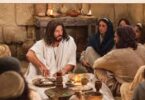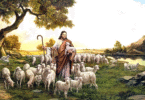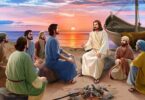6th Sunday of Ordinary Time (Year C)
Scripture: Jer. 17:5-8; Ps. 1:1-2, 3, 4, 6; 1 Cr. 15:12, 16-20; Lk. 6:17, 20-26
An excerpt from 101 moments of Hope by Edward Grinan gives a beautiful story of Hope. One fine day, he saw a big statue of St. Jude in his room. It was probably brought there by his mother when he was asleep. He was a mischievous teenager. His mother was always worried about him, therefore, she turned to St. Jude, the patron of hopeless cases for his protection. She brought a big statue and placed it in his room. He did not like it, so he placed it in the hall where it would not bother anyone. The next morning, it was back in his room. He was annoyed with his mother’s behaviour. He decided to put up in a higher place where his mother would not reach. Yet it was back again in his room again the next day. He realized that there was no point in fighting with his mom. It remained there for years. When he turned into an adult, he went to church, and it was the feast of St Jude. The priest said that we celebrate the feast of St Jude, patron of hopeless cases, and I believe this fact because those who come to Jesus through his intercession believe that even the most difficult problems can be made right by God. It was only then he realized his mother’s heart was full of hope.
Today’s liturgy revolves around the message of hope. In the first reading, the prophet Jeremiah lived in the most difficult period in the history of Israel i.e. the Babylonian exile. The prophet also experienced persecution within the socio-religious structures but he did not give up his mission. He constantly proclaimed the Word of God to the King and his people for which he was humiliated every time. As a result, Babylon had the victory over Israel. The king and the leaders were imprisoned. The prophet motivated them to take the right direction in their lives. Many believed that they should seek help from the Egyptians. But Jeremiah discouraged it. He warned them that they should not trust in man i.e. the Egyptians. He compared their military tactics to the barren bush in the desert. One of the scholars calls it the cursed lemon or Sodom Apple. This tree was cursed when God had destroyed Sodom. The shrub grows in the desert salt land. Its fruit is hollow and filled with webs and dust. He invited them to trust in the Lord just like the tree planted beside the waters. These trees spread their roots to the stream of water. It does not fear the heat. It remains green and bears fruits. Prophet Jeremiah was a man who had great hope in the Lord even in his most trying moments. He invited his people to have hope in the Lord by referring to Psalm 1 whose response is: Blessed are they who hope in the Lord.
St. Paul makes a strong argument against those who were not ready to believe in the resurrection of Jesus Christ. If Christ did not rise from the dead then our life, faith, religion, Christianity would not only be false but be utter folly. These people had thought that bodily resurrection was just impossible. St. Paul exhorts them to believe in the resurrection which is real. It guarantees our own resurrection. Jesus is the first one to be raised from the dead. St. Paul preached hope to the Corinthians by preaching the resurrection of Jesus Christ.
In the gospel according to St Matthew, Jesus preached the beatitudes from the mount. St. Luke prefers Jesus giving it on the Plain where people can hear him, reach out to him and touch him. Luke presents Jesus giving four beatitudes and four woes. They are addressed in the four concrete areas; poverty, hunger, weeping and hate. Each end has a reward. Jesus invites them to rejoice and leap for joy whenever they are in these situations. He calls them blessed (Gk. – makairoi). It means a sense of congratulations or the fortunate one. The first three beatitudes apply to everyone and the last one is addressed to the followers of Christ. We are unhappy because of our poverty, hunger and sadness. Goodness is in spite of our poverty, hunger and sadness, we are recipients of God’s love. In all these conditions, we need to be dependent on God. Our dependence on God brings us closer to God. All those who hope in the Lord, are not deprived of his mercy. The fourth beatitude is addressed to those who are persecuted for the Gospel. They are blessed because they will inherit their reward in heaven. They are participating in the suffering of Christ and they join with the great assembly of people who have suffered for the Gospel. Jesus preaches through these beatitudes hope among the faithful who are lost in their struggles of life.
The story of Edward Grinan and all three readings give us a message of hope. There is a famous proverb that says, “while there is life, there is hope”. Life without hope is considered to be lifeless living. There is yet another saying about hope. It says, “Man can live without breathing for five minutes but without hope, he cannot live even for a second.” These sayings have profound meaning. We begin to understand that the virtue of hope is a guiding force for a man to live on this earth. It helps him from discouragement. It sustains him in times of abandonment. It opens him to eternal happiness. It preserves him from selfishness and dark forces. In other words, hope keeps man alive in the world which is gradually leading to despair. Hope is a guiding force. Jesus is our hope. God wants us to communicate Christ; the hope in the world which is full of miseries. We can communicate Christ: the hope by living. The church invites us to live by hope and thus become a hope for others. May Christ bless each one of us to be a sense of hope to the hopeless.






